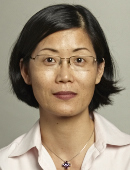
Seunghee Kim-Schulze, PhD
About Me
Seunghee Kim-Schulze, PhD, is a Professor in the Department of Immunology and Immunotherapy and the Facility Director of the Human Immune Monitoring Center (HIMC) at the Icahn School of Medicine at Mount Sinai. Dr. Kim-Schulze is a leading expert in translational immunology and multi-omic immune monitoring, with a career spanning more than two decades across the United States and the United Kingdom. She received her PhD in Biochemistry from the University of Illinois and completed postdoctoral training at Northwestern University, Imperial College London, and the Herbert Irving Comprehensive Cancer Center at Columbia University, where she specialized in cellular immunology and early immunotherapeutic development.
Recruited to Mount Sinai in 2009 by Dr. Miriam Merad, Dr. Kim-Schulze co-founded and built the HIMC into one of the world’s most comprehensive academic immune monitoring centers, now a ~25-person multi-omics powerhouse supporting more than 150 clinical trials annually across oncology, autoimmune disease, cardiovascular disease, neuro-inflammation, psychiatry, and infectious disease. Under her leadership, HIMC recently expanded into a new 5,000 sq ft precision immunology space, incorporating state-of-the-art platforms including high-parameter flow cytometry, CyTOF, bulk and single-cell transcriptomics, spatial transcriptomics/proteomics (10x Xenium, RareCyte Orion), and large-scale proteomics (Olink Explore HT).
Dr. Kim-Schulze’s scientific contributions span biomarker discovery, immunotherapy mechanisms, and cross-disease immune signatures. She has led correlative studies for numerous investigator-initiated and industry-sponsored immunotherapy trials, producing influential manuscripts in Nature Medicine, Nature Cancer, Cell, Science, Cancer Discovery, and others. Notably, her early work identifying PD-1–high tumor-infiltrating immune cells as a poor-prognostic population in melanomapre-dated and helped contextualize the clinical breakthrough of PD-1 blockade. Her recent studies have revealed shared inflammatory and immunoregulatory signatures across cancer, autoimmunity, sepsis, cardiovascular disease, and neuropsychiatric conditions, supporting the concept of conserved immune trajectories across diverse diseases. Currently, Dr. Kim-Schulze leads multiple large-scale biomarker initiatives using deep proteomics (Olink Explore HT), spatial multiomics, and single-cell immune profiling to dissect cytokine, chemokine, and stromal–immune networks in tumor microenvironments and inflammatory tissues. Her group is actively identifying soluble and cellular biomarkers of response, resistance, and toxicity across oncology, inflammatory bowel disease, autoimmune disorders, neurodegeneration, psychiatry, and cardiovascular surgery. In 2024, Dr. Kim-Schulze co-founded and serves as Chief Scientific Officer (CSO), OCCAMimmune, an academic research organization (ARO) specializing in immunology-driven biomarker and multi-omics support for clinical trials. As the Chief Scientific Officer, she has built OCCAMimmune into a strategic partner for both academic investigators and industry sponsors, integrating rigorous assay development, data analytics, and regulatory-compliant operations. Across HIMC and OCCAMimmune, Dr. Kim-Schulze has mentored more than 70 trainees, authored more than 180 peer-reviewed publications, and continues to drive the next generation of precision immunology by bridging high-dimensional technologies with clinical impact.
Language
English
Position
PROFESSOR | Immunology & Immunotherapy
Research Topics
Alzheimer's Disease, Anti-Tumor Therapy, Antigen Presentation, Blood, Cancer, Cellular Immunity, Dendritic Cells, Immunological Tolerance, Immunology, Immunosuppression, Inflammation, Inflammatory Bowel Disease (IBD), Multiple Sclerosis, Parkinson's Disease, Proteomics, Tumor Suppressor Genes, Tumorigenesis